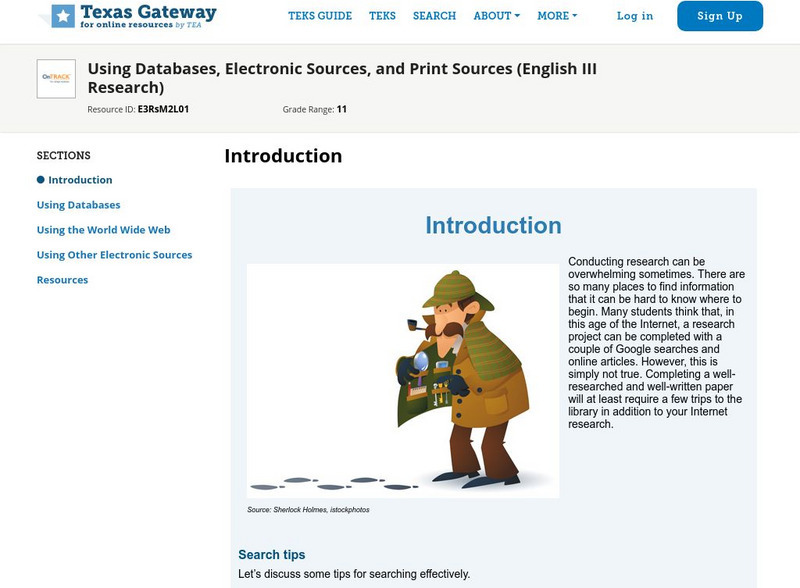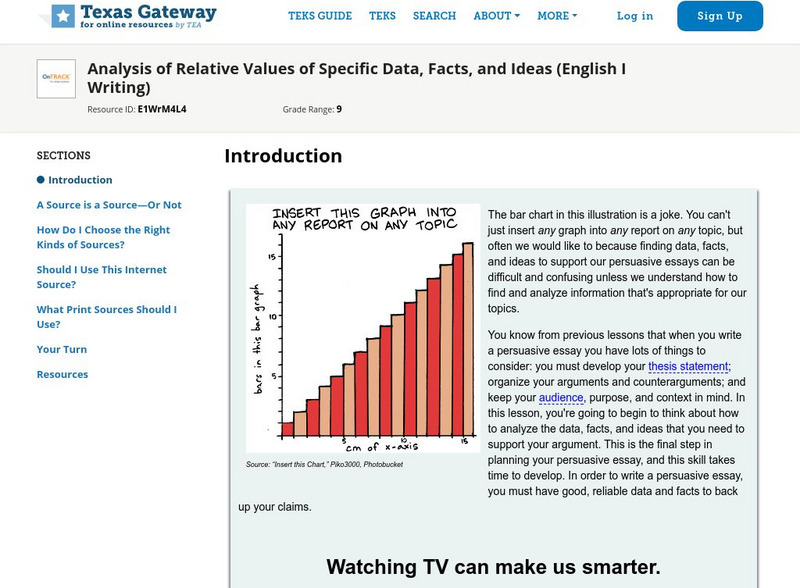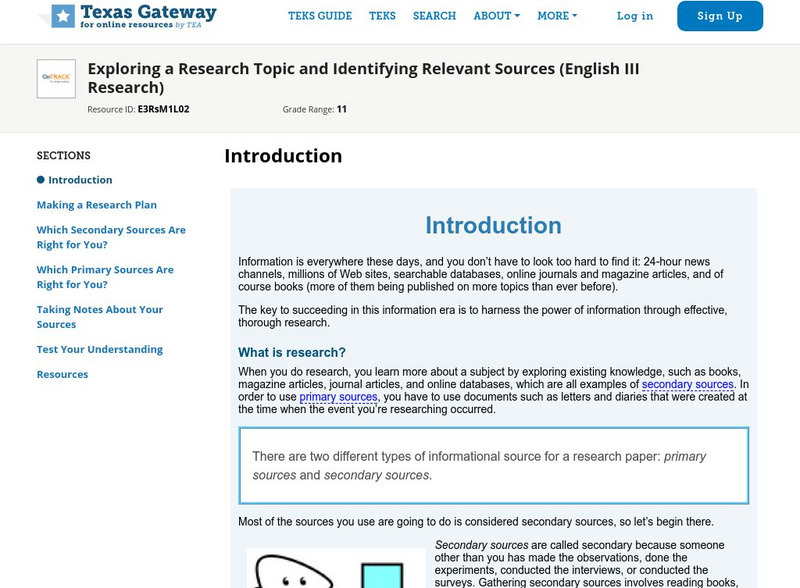Sophia Learning
Sophia: Research Sources
This slideshow lesson focuses on research sources by listing 10 types of sources: books, periodicals/magazines, newspaper articles, scholarly articles, databases, reviews, interviews, lectures, media (film, television), and websites. It...
Sophia Learning
Sophia: Research Sources: Periodicals
This slideshow lesson focuses on the use of periodicals as research sources; it discusses the pros of using periodicals as organizational aids and in research of current events and also the cons of periodical's lack of depth and possible...
Read Works
Read Works: Lessons: Lesson 3: Identifying Facts and Forming Opinions
[Free Registration/Login Required] A lesson plan and materials to teach kindergarten students identify facts and form opinions using the book Animal Smell.
Other
Umuc: Secrets of My Research Success
This 35-minute interactive tutorial models the research process via the story of Quentin, a UMUC student. It takes him through the various research process steps: understand how to locate background information on his topic by showing...
Other
Kathy Schrock's Home Page: Abc's of Website Evaluation [Pdf]
Noted technology educator Kathy Schrock provides an alphabetical list of qualities to evaluate in judging websites. She provides example websites to look at for each quality. In addition, she gives a list of websites to use when...
International Reading Association
Reading Online: Classroom Strategies for Exploring Authenticity in the Media
Four innovative classroom activities that actively engage students in analyzing and criticizing media messages. SL.11-12.2 Eval&Integrate sources
Georgia Department of Education
Ga Virtual Learning: Nonfiction and Reseach: "Choosing Nonfiction Sources" [Pdf]
This is the 20-page PDF "Choosing Nonfiction Sources." It provides informatation about various types of nonfiction: primary and secondary sources, reference works, databases, newspapers and periodicals, and nonfiction books; it also...
Virtual Salt
Virtual Salt: Evaluating Internet Research Resources
This site by Virtual Salt offers a great deal of information on evaluating internet sources. Gives tips on what to look for when screening information for usefulness and reliability.
Annenberg Foundation
Annenberg Learner: Interactives: Historical and Cultural Contexts
This interesting interactive website explains kinds of primary sources and gives you the chance to identify them in some games.
University of North Carolina
University of North Carolina: Writing Center: Handouts: Evidence
What kinds of evidence best support the points you make in a paper? Where can you find the evidence you need? This handout answers all these questions and more, including the difference between primary and secondary sources. You'll also...
Online Writing Lab at Purdue University
Purdue University Owl: Avoiding Plagiarism
Plagiarism is a serious offense in many educational settings. Plagiarism and copyright laws are reviewed here. Activities to avoid plagiarism are also provided through links. W.9-10.8 Sources, W.11-12.8 Sources/Integrate/Cite;...
Other
Babson College: Evaluating Quality on the Net
Internet research is a fine writing tool, but can you trust the information you find? This presentation by Hope N. Tillman, Director of Libraries at Babson College, gives advice on assessing the quality and credibility of information...
University of California
Uc Berkeley Library: Critical Evaluation of Resources
Questions to ask yourself when determining if a source is reliable. Discusses difference between primary and secondary source. List of reference sources and links to other sites that teach you how to evaluate sources....
Duke University
Duke University Libraries: Finding Primary Sources
Finding primary sources can be difficult and confusing at times. This site provides a list of history databases, rare books and manuscripts, and research guides for those looking for primary resources such as diaries, letters,...
Texas Education Agency
Texas Gateway: Using Databases, Electronic Sources, and Print Sources
How to access electronic sources and databases in addition to print sources and list all in a working bibliography.
University of Sydney (Australia)
The Write Site: Why & How to Use Sources
This University of Sydney reference explains the importance of using reputable sources in academic writings. Then the site provides steps to follow to assist students with using bibliographic sources. Click on the sections list to...
University of North Carolina
University of North Carolina Writing Center Handouts: Plagiarism
Use this handout to learn what plagiarism is and specific ways to avoid it. The explanation of "common knowledge" should be particularly useful to students. Although this handout is directed to college students, it is equally applicable...
Texas Education Agency
Texas Gateway: Determining Validity and Reliability of Sources
This lesson will help students decide which sources are valid and reliable for supporting a thesis. It discusses how to evaluate books, articles, websites, and more.
Texas Education Agency
Texas Gateway: Analysis of Relative Values of Specific Data, Facts, and Ideas
[Accessible by TX Educators. Free Registration/Login Required] In this lesson, students can practice finding specific types of sources and learn the questions to ask when evaluating information for a persuasive essay.
Texas Education Agency
Texas Gateway: Documenting Sources and Writing a Bibliography/works Cited
This lesson focuses on documenting research sources and writing a bibliography or Works Cited page. It discusses when and how to document your sources using MLA style. W.9-10.8 Sources, L.9-10.3a Standard Format
Texas Education Agency
Texas Gateway: Analysis of Relative Values of Specific Data, Facts, and Ideas
[Accessible by TX Educators. Free Registration/Login Required] This lesson focuses on analyzing and evaluating the value of the sources used for evidence in a research project.
Media Smarts
Media Smarts: How to Recognize False Content Online: The New 5 Ws [Pdf]
A tip sheet to help both students and adults learn how to test online content for validity.
Texas Education Agency
Texas Gateway: Exploring a Research Topic and Identifying Relevant Sources
In this lesson, students learn how to plan their research, find relevant primary and secondary sources, and use those sources in your research papers. W.11-12.8 Sources/Integrate/Cite
Texas Education Agency
Texas Gateway: Gathering Appropriate Information (English Iii Writing)
[Accessible by TX Educators. Free Registration/Login Required] This lesson focuses on finding and evaluating relevant sources for a research project. It includes primary and secondary sources and print and internet sources. W.11-12.2...




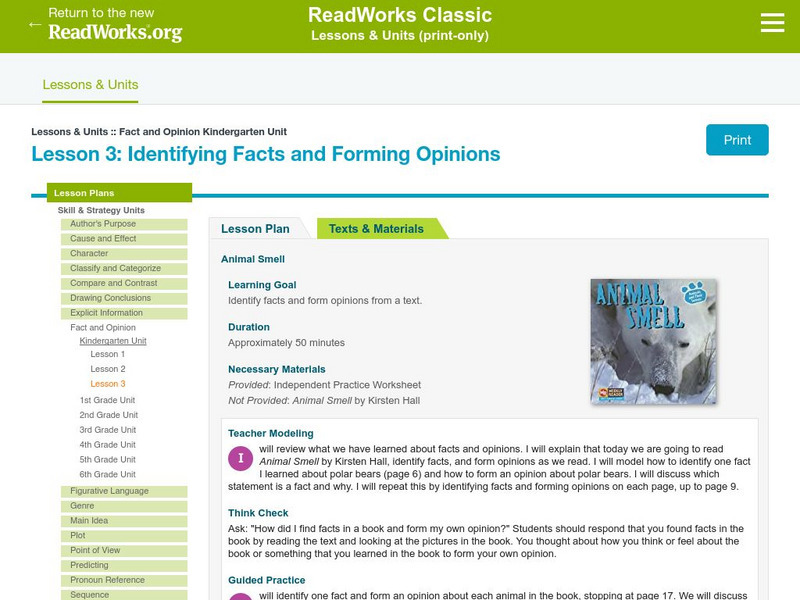
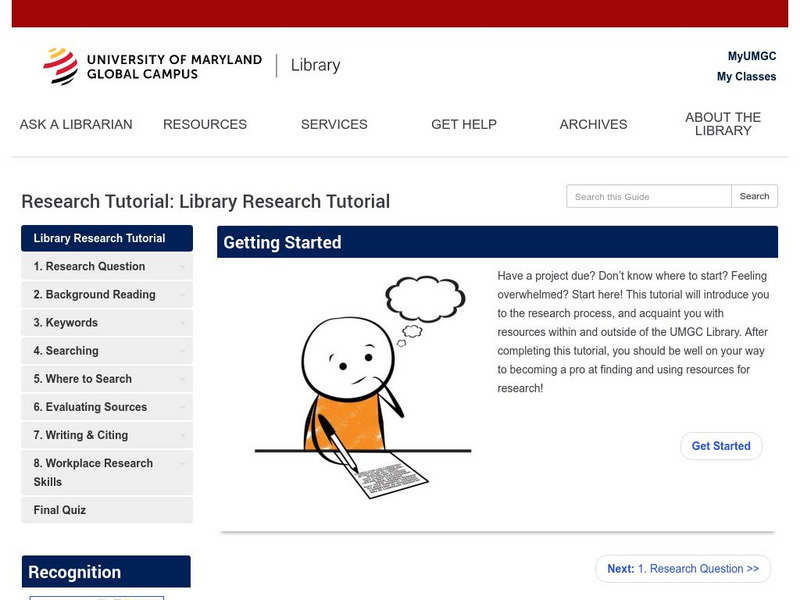
![Kathy Schrock's Home Page: Abc's of Website Evaluation [Pdf] Activity Kathy Schrock's Home Page: Abc's of Website Evaluation [Pdf] Activity](https://d15y2dacu3jp90.cloudfront.net/images/attachment_defaults/resource/large/FPO-knovation.png)







